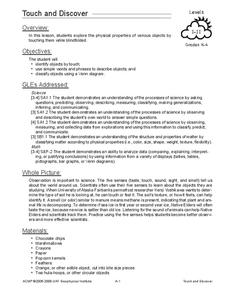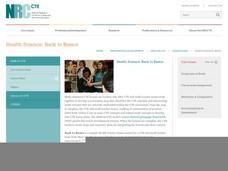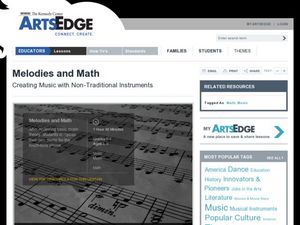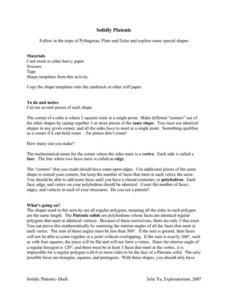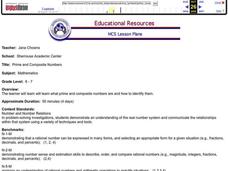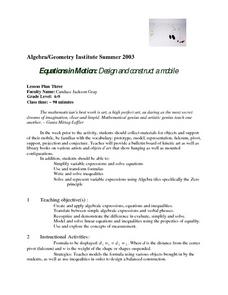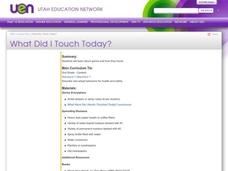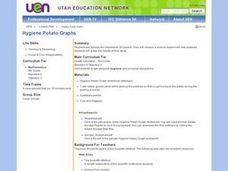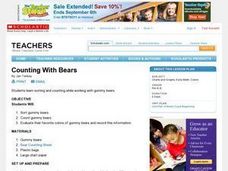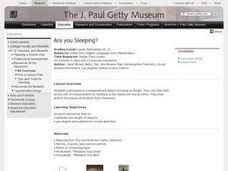Curated OER
Touch Math
Using the touch math system, learners engage in activities to practice adding numbers. While the lesson is laid out in an explicit manner, there isn't a guide explaining the touch math system.
Illustrative Mathematics
Seven Circles III
A basic set-up leads to a surprisingly complex analysis in this variation on the question of surrounding a central circle with a ring of touching circles. Useful for putting trigonometric functions in a physical context, as well as...
Curated OER
Touch and Discover
Students identify the physical properties of items using the sense of touch. For this touch and discover lesson, students describe items. Students sort items using a Venn diagram.
Coloring Squared
Four‐Leaf Clover: Practice Subtraction
Scholars demonstrate their proficiency in subtracting one-digit numbers and color squares a specific color depending on whether their resulting values are one, two, or three. A completed practice page shows a festive four-leaf clover!
Curated OER
Math Prefixes
Students use a dictionary to gather appropriate information for writing simple definitions. They recognize prefixes that relate to numbers, such as mono-, bi-, and tri-. Pupils use their creative abilities to extrapolate new words to...
National Research Center for Career and Technical Education
Health Science: Back to Basics
This lesson focuses on unit conversion, proportions, ratios, exponents, and the metric system. Discuss measurement with your math class and demonstrate how to solve several health-science word problems. Give learners a chance to visit an...
Curated OER
Melodies and Math: Creating Music with Non-Traditional Instruments
Review the 4/4 and 2/4 time signatures in music with a helpful music theory lesson plan. Young musicians experiment with electronic sounds and create their own musical performance using instruments made from materials found in the...
Curated OER
Solidly Platonic
When they do, they learn. Using this resource, young mathematicians learn about platonic solids by actually building, touching, and examining the shapes. They connect their observations about the shapes to Euler's formula.
Curated OER
Prime and Composite Numbers
Prime and composite numbers are the focus of this mathematics lesson. In it, learners practice techniques for identifying these two types of numbers. They utilize the Inspiration program to complete a task that is clearly explained, and...
Beacon Learning Center
Spotted Stones Linked Just Right
Discover how to play the game of dominoes using mental math skills to solve equations that earn points. Pupils become fast critical thinkers in determining which unknown addend tally up points in their favor.
Baylor College
Using Food Labels
Help your class make sense of nutrition labels with the ninth lesson of this series. After explaining the different information provided on packaged food labels, perform an activity that demonstrates the amount of sugar in a single can...
Curated OER
Water Wonders
Students measure the amount of surface tension using a balance scale after a classroom demonstration students diagram the appearance of several liquids and label them.
Curated OER
Counting by 1s Puzzle Worksheet
This dog is apparently quite upset that he is separated from his bone; can your learners use their counting skills to guide him back to it? The hundreds chart just took a fun twist! Scholars start at one on the bottom of the chart, and...
Curated OER
Equations in Motion: Design and construct a mobile
Students participate in a instructional activity that covers the concepts of solving equations and inequalities. To master the concept they must demonstrate visually and verbally how both sides of an equation must be balanced. They...
Curated OER
In Touch with Apples
Students read "How To Make an Apple Pie and See the World", the story of a girl who traveled the world to find the ingredients to make her apple pie. They conduct a series of interdisciplinary activities including testing their senses,...
Curated OER
One-to-one Correspondence
Young scholars count and keep track of objects using one-to-one correspondence. By moving, touching and pointing to objects they organize counting to determine the number in a set accurately. This helps students to practice the skill of...
Curated OER
What Did I Touch Today?
Second graders describe and adopt behaviors for health and safety. They explore what germs are and how they can make you sick. Through graphing activities, 2nd graders examine the way germs travel and what they can do to prevent the...
Alabama Learning Exchange
The Five Senses: How They Relate to our World
Students explore the five senses and the significance of each sense. In this five senses and diversity lesson, students listen to You Can't Smell a Flower With Your Ear by Joanna Cole and take a walk observing opportunities to use all...
Curated OER
Hygiene Potato Graphs
Fifth graders discuss the importance of proper hygiene. After watching their teacher peel potatoes, they discuss why she was wearing rubber gloves. They demonstrate how to wash their hands properly and why one should never touch...
Curated OER
Regular Polygons
Fifth graders explore polygons. In this math lesson, 5th graders find examples of regular polygons in the classroom and measure the sides of figures to determine if they are regular polygons.
Mathematics Vision Project
Geometric Figures
Logical thinking is at the forefront of this jam-packed lesson, with young mathematicians not only investigating geometric concepts but also how they "know what they know". Through each activity and worksheet, learners wrestle with...
Curated OER
Counting With Bears
Students sort gummy bears, count gummy bears, and evaluate and record their favorite colors of gummy bears.
Curated OER
Pac Man Subtraction
Third and fourth graders engage in a game using visual symbols, auditory responses and tactile stimuli to further their understanding of subtraction. A worksheet imbedded in this plan explains how to teach the game.
Curated OER
Are You Sleeping?
Here is a measurement activity focusing on length. Learners use their feet as the unit of measurement for furniture in the classroom and at home, and sketch the pieces of furniture they measured.




